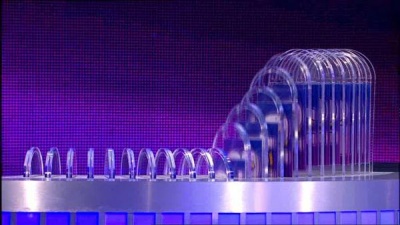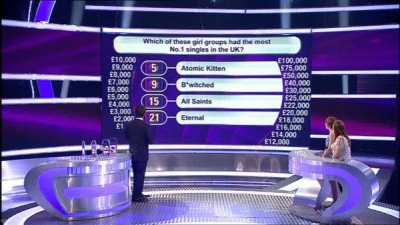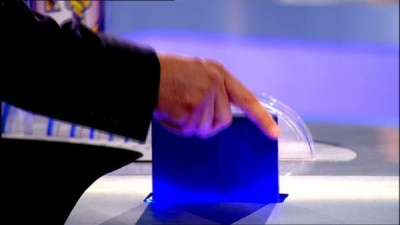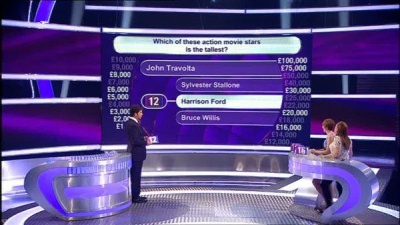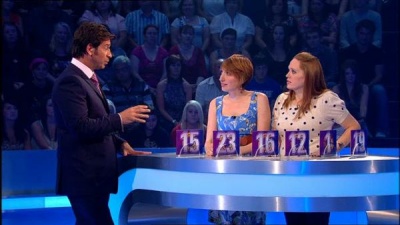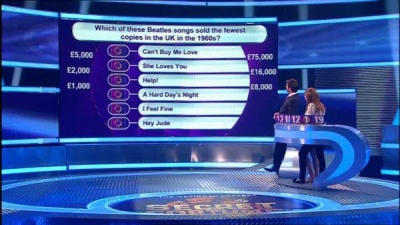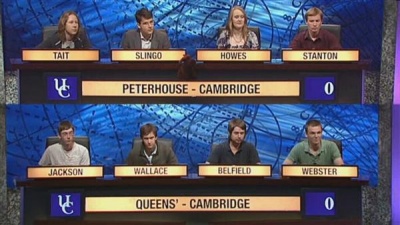Weaver's Week 2011-02-27
Last week | Weaver's Week Index | Next week
It's Saturday night, it's BBC1, so we're going to get one of four things from the next programme. Is it:
- A) Larger than life and a bit dumb
- B) A chance to see the aspiring actors of the future
- C) Nick Knowles fronting a tricksy little quiz
- D) An excuse for Gary Lineker to get on the telly yet again
Contents |
Secret Fortune
Wild Rover for BBC1, Saturday evenings
On a very purple set, Nick Knowles walks out and says that someone could win a fortune tonight. Who might be the champion? It's two people we've never met before, but Nick's now introducing us to. It might be Lou and Jo, two sisters who want to travel the world and eat lots of cakes. Or Chris and Megan, who are saving up for their dream marriage.
Whatever, Nick promises them some money. It's somewhere in his Pop Up Toaster Rack of Riches. By the sheer force of personality, Nick is able to make the world's largest toaster rack appear from out of his desk. In each of the prongs of the toaster rack is a numbered card, which contains an amount of money. And then, like hot croissants at a hotel buffet, he can make the toaster rack disappear again.
The game would be somewhat tedious if all of these envelopes contained exactly the same amount of money. So, just to add to the tension, each envelope has been assigned a different amount of money; the smallest contains £100, the largest has a full £100,000. The contestants don't know where any of the money is, the host doesn't know where the money is, but the independent adjudicator does, and so does the Secret Fortune computer. At this point, our thought was, "Twenty-four sealed purple envelopes. And no questions, except one." This would turn out to be inaccurate by a factor of eleven.
For the opening round, the contestants pick four numbers between 1 and 24. As a reminder, the numbers yet to be picked are displayed on LED boards behind Nick's head. In the opening rounds, the contestants tend to pick numbers that mean something to them; this get a bit old a bit quickly, and is quietly dropped after about two cycles. The appropriate prongs of the Pop Up Toaster Rack of Riches pops up as each number is called. Once all four are in place, Nick asks a question with four possible answers.
All of these questions are asking after a quantifiable achievement – the most number one singles, the longest river, the shortest attention span. For a fleeting moment, we wonder if we're watching a show that will be similar to The Million Pound Drop Live. But this is only a fleeting moment.
The Secret Fortune computer isn't bothered about being anthropomorphised, we can't add its name to Eugene's data banks. Instead, it's spent literally some moments working out which of the values in the envelopes is the highest, and associated it with the right answer. The second-place answer has the second-highest value, the third-place answer corresponds with the third-highest value, and the bottom with the bottom.
Anyway, what the contestants are asked to do is, one by one, reject the answers offered. Nick will then pluck out the appropriate envelope from the Pop Up Toaster Rack of Riches, and open it up. He'll tell the players, "Your secret fortune is not ..." and reveal the amount noted in the envelope. It's the show's catchphrase, simply because the host is going to repeat it at least 22 times in the course of the programme. He'll then bin the envelope in a slot to the side of his desk, so it lands in a locked container to which no-one has access. Except, possibly, for a security guard on secondment from The Million Pound Drop Live.
So, if we're going to treat the question at the start of this week's column as an example, the lowest answer would be D, as there's no danger of seeing anyone who looks like a packet of crisps. The top answer would be C, because this is Nick Knowles' show, and it is a tricksy little quiz. We reckon B would rate more highly than A, but others may disagree.
Whichever envelope is left after three rejections goes across to the players' side of the table, where it's put in the Static Toaster Rack of Riches, so named because it doesn't pop up at all. The computer then confirms the top answer, and – if the players have picked something different – a caption gives the full result for viewers at home. If the players eliminated £50,000, £15,000, and £3000 with their responses, and have the second answer, we viewers know that they've got a tidy amount. But the contestants don't know this.
The amounts of money eliminated have been dimmed from the possibilities shown on the main board, but they're not shown against their answers, thus making it far more difficult for the alert viewer to keep precise track of what's in play. It's almost as if the producers expect everyone to be half-watching the programme.
Repeat this exercise six times, so that 18 of the envelopes have been opened and binned, and the remaining six are on the Static Toaster Rack of Riches. Then cut to a commercial break from The Lottery Corp.
Round two follows a similar tactic to round one, in that the questions are again about ranking various lists in order, and the players will eliminate based on their performance. For instance, a five-envelope question might be:
Which of these game shows ran for the fewest episodes?
- A) Fluke
- B) Wanted
- C) Shafted
- D) Panic Attack
- E) Judgement Day
If the contestants pick the programme that had just two episodes, they will eliminate the lowest amount of money remaining, thus ensuring that their prize will be a bit bigger. If they pick the show that went off air after four episodes, they get rid of the second-lowest amount. And so on, until if they choose the show that ran for 17 episodes, they're removing the top prize remaining, and ensuring they can't win it. Not that the contestants know which envelope they're removing, these are just options until the computer reveals which number is associated with the answer, and then Nick confirms the prize they're not winning.
Now, all of this is fine until we come down to the very last question. For some reason, an awful lot of people get confused here, and we've no idea why. Like the previous ten questions, the answers are ranked by some obvious metric, and the most correct answer will eliminate the lower value. The more correct answer will eliminate the lower value. Take, for instance,
Which bunk bed is traditionally cheaper?
- A) The lower
- B) The higher
If the team picks answer A, they have picked the wrong answer, and they will eliminate the higher prize remaining, thus winning the lower. If they pick B, they have got it right, and will eliminate the lower prize, and take the higher. As is common knowledge, B is correct because if you want to hire the lower, you gotta go higher.
Confused about which way the questions are going? It's actually tremendously simple. In the first half of the show, the contestants are asked questions of the bigger, better, more variety. Right answers are large, because they're trying to keep large amounts of money in play. In the second half, they're asked to find the smaller, fewer, less of a set, because they're trying to eliminate small amounts. The question with two answers tends to be more obvious than our example – indeed, it's no more fiendish than the final questions from Million Pound Drop Live – but the principle remains. It's a credit to Nick Knowles' ability that he explains this clearly and concisely, and makes it obvious what is going and what is staying.
There are a few little tweaks we could make to the show – in the first round, more clearly associating money with the wrong answers would help the viewer. If the average viewer proves completely incapable of following the two-envelope question – and we have enough faith in the Great British Public to say they can – then make the three-envelope question the last. The programme is mostly low culture questions, we'd expect nothing else in the timeslot.
Like Deal or No Deal, Secret Fortune guarantees a winner; unlike that show, there are no mind games, no psychological manipulation, and (most importantly) no bearded elf. The contenders have to work for their money, and to win the top prize they have to make six correct decisions, including two 50/50 decisions between answers of similar magnitude. The presentation is very moreish, there aren't enough purple sets at the moment, and the whole programme comes across as a bit of fresh air.
University Challenge
Deci-final 7: Peterhouse Cambridge v Queens' Cambridge
We had to think about where we are in the structure before this game – this is the second winners match, and the victorious side tonight will progress to the semi-finals, where we think they'll avoid Sheffield. Peterhouse's win was against York on 17 January; Queens' beat Bristol on the 31st. Queens' get the show off to a good start, with a brief history of detente, but Peterhouse respond by knowing Little Lord Fauntleroy.
Queens' do even better with quotations about science, and Thumper is right to tick off someone for pausing after buzzing. You buzz, you answer, it's reasonably simple. The visual round is childhood pictures of young political figures, though not including a picture of George Osborne in his school uniform. Queens' have a 65-30 lead, reduced by knowledge of the stalking horse and Henry VIII's wives. Gödel's Incompleteness Theorem crops up as one of the answers here, and that'll be this week's crossover with The 3rd Degree, the new quiz show on Radio 4. It's better than Quote... Unquote.
Queens' prove to know a lot about quarks, and Peterhouse a little less on the life of artists. Musicals based on works of literature provide this week's audio round, and it gives Peterhouse their first lead of the night, 100-85. Hidden transmission indicator of the week is a question about the Duckworth-Lewis method, as used in cricket. Hidden what the heck indicator of the week is a question about monarchs who succeeded to the thrones in years that were prime numbers, and the question asks after that prime number in sequence. Us neither. Smart question of the week:
- Q: On a typewriter keyboard, if the key one to the left of the correct letter is pressed each time, which European capital is spelled as IAKI?
It's part of Peterhouse's rather promising comeback, they also pick up a set of bonuses on canals, including the fact that Birmingham has more canals than Venice. We also have far more square miles than Venice. Anyway, the second visual round is on depictions of the Garden of Eden, and Peterhouse's lead has stretched to 170-95. Queens' need a quick comeback, and start it from novels by Philip K Dick. Their knowledge doesn't stretch to London art galleries, but does include tuna and alternative names for elements.
Five minutes, 40 points the gap. Peterhouse get a starter asking to add up three ages, and spend a long time getting nothing on questions about dust. Two more starters will win it for Peterhouse, but "north" and "east" are both wrong when the answer is "north-east". Queens' pick up one about flags of the world containing the union flag, but don't get anything for adding up money. They do get "half-life" from the name Alex Bellfield, and that helps to close the gap to 25 with 90 seconds to go.
There's been enough dallying to allow Peterhouse to win this with one, and they get one. Adding some questions about Mercury, and the Hubble constant, help the side secure their win – always helps to have an astrophysicist on your team. At the gong, Peterhouse have won it comfortably, 215-160.
Five starters for Ben Slingo, and Peterhouse made 17/37 bonuses. It was 14/27 bonuses for Queens', whose top scorers were Simon Wallace and William Belfield. There wasn't a missignal all night, and the overall accuracy was 53/89.
Mastermind
Heat 24
It's the last heat this week, so any score of 28 points in first or second place will qualify. 27 points and no passes will tie with Karl Taylor from last week.
Into the chair steps Diane Hallagan, one of many fine quizzers from Leeds, and she's taking the Brandon Family novels of Peter Tinniswood (1975-85). A northern comic writer, Peter Tinniswood created a series of books giving adventures in the life of a working-class Yorkshire family. The novels – apparently out of print at the moment – were adapted for television as "I Didn't Know You Cared" (1975-9) and gave rise to the radio series "Uncle Mort's Country" (1987-96). Her round leaves a little room to tilt at, the final score is 12 (2).
Martin Gamble is next up, he's discussing the Life and Career of Douglas Jardine (1900-58). Jardine played cricket for Surrey and England, and captained the latter on the Ashes tour of 1932-3. During this series, he deployed the "Bodyline" tactic of bowling at the opposition players, rather than at the wicket. It's a round all about cricket, so ends with a rugby score: 15 (0).
Lee Holmes is going to take British Domestic Politics 1970-2010. It's a big subject, spanning from such serious characters as Commander Bill Boakes and Lord David Such to frivolous fly-by-nighters like Keith Joseph and Michael Foot. Does anyone remember David Davis? Apparently so. For a wide-ranging round, this is a remarkably strong round, finishing with just the one error (and that of degree, "Metropolitan Councils" rather than "Metropolitan Counties") so finishes on 16 (0).
And finally! Tom Weir is the 96th and final contender this series, and he's taking The Pilgrimage of Grace, a rebellion from October 1536. Well, that's what the pre-publicity for this show said. He's actually taking Orde Wingate and the Chindits; Wingate was the leader of the British forces in Burma during the Second World War, and the Chindits were his blitzkrieg fighters. The round runs up the scores like lightning, finishing at 11 (3).
Mr. Weir resumes the chair by answering a question about the Kennedy Space Centre, then adds Leicester and the leopard to his pile of correct answers. Who hosts Film 2010 these days? No-one, it's 2011. Boom boom. The pile of answers doesn't grow that much further, ending on 17 (9).
Diane Hallagan starts by saying "pass, pass". This is unusual from one of the reigning Masterteam champions, and she remembers Loch Morar and the origins of the name Fletcher, then "Dalziel and Pascoe" and suddenly the points are flowing. The ley lines, the Dubliners, "Those were the Days", and Lerwick's location on the Shetlands pushes her past 28 points and an – almost! – certain space in the semi-finals. 29 (6) is the final score.
Mr. Gamble therefore needs fifteen to be utterly assured of progress. Fourteen, so long as he doesn't pass all that much. The Most Valuable Player award gets him off to a good start, but we do wonder if our host had to name all of Pan's People. The phrase "Post early for Christmas" dates back to the 1880s, back in the days when people didn't need to hand-deliver t-shirts in the pouring snow because they didn't trust the postie. There's a question asking for the name of the stretch of motorway near South Mimms; we wonder if they would have accepted the M16. The final score is 26 (2), so Diane Hallagan's through.
And Mr. Holmes needs twelve correct answers to progress. Who are Ant and Dec? Where's Amsterdam? Does anyone remember Bananarama, other than fans of the letter A? Mensa, why? Whatever happened to Damon Hill? Will the contestant step out of this pass spiral? Is there really a dinosaur named after Mark Knopfler? Most of these are answered correctly, and the final score of 30 (5) is a winning one.
So Lee Holmes, a landlord from Gateshead, is tonight's winner. He's joined in the semi-finals by quiz regular Diane Hallagan.
Those semis begin next week, with five contestants per episode. The show will feature questions on all, some, or fewer of the following: Glamorgan cricket, Dark Ages in Britain, Thomas Paine, Jack Reacher novels, "Our Friends in the North".
This Week And Next
Answers to the second example question from the Secret Fortune review. Judgement Day lasted two episodes, so that would be the right answer. The rest: Shafted (4), Fluke (6), Wanted (16), and Panic Attack (17).
In the week to 13 February, Dancing on Ice remained the UK's most-seen show, 8.6m saw the performances. Secret Fortune debuted with 6.1m viewers, and Push the Button 2.0 Live! had 5.85m on its return. It did help Take Me Out to a year's best 4.75m. On the minority channels, University Challenge scored 3m, Antiques Road Trip 2.8m, and The Million Pound Drop Live 2.55m.
Ring the changes on the digital networks; Celebrity Juice is back, and its 1.2m viewers make it the most-seen programme, ahead of a mere 1.08m for Got to Dance. Come Dine With Me has recovered to 825,000, but we wonder if Pop Idle Us has lost its lustre – this week's show attracted just 510,000 viewers. In the battle of cookery competitions, Hell's Kitchen Us has a toasty 610,000 for ITV2, Masterchef New Zealand a comfortable 165,000 on UKTV Watch, and reruns of Masterchef The Professionals perk up UKTV Good Food with 38,000 viewers.
Be very careful, because Mark Lawson Talks At Anne Robinson this week (BBC4, 7.30 Monday). James Brown looks for the Great British Hairdresser (E4, 10pm Monday), Trade Your Way to the USA gets a repeat on BBC1 (4pm Wednesday), and of all the unexpected repeats, there's another chance to see Codex (C4, 2.55am Tuesday). Wales is marking St David's Day with Cym (S4C, 10pm Tuesday), a comedy panel game; the annual Can i Gymru goes out on 6 March.
To have Weaver's Week emailed to you on publication day, receive our exclusive TV roundup of the game shows in the week ahead, and chat to other ukgameshows.com readers, sign up to our Yahoo! Group.


